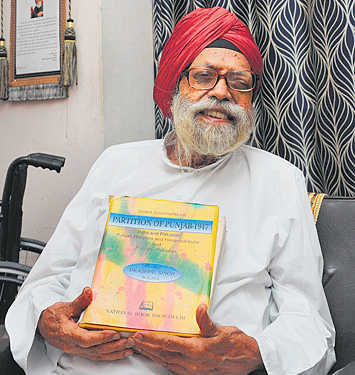
Prof Kirpal Singh. Tribune file
Vishav Bharti
Tribune News Service
Chandigarh, May 7
Prof Kirpal Singh, the first chronicler of Partition, who started building an archive in 1954, passed away here on Tuesday. He was 95.
His last work was aimed at “fixing the responsibility” for the tragedy. He had once said that not even one of the key figures he had interviewed was ready to take responsibility for the monumental human tragedy that had unfolded seven decades ago.
His journey in Partition’s historiography began in 1953 as a young lecturer at Khalsa College, Amritsar. Bhai Veer Singh called him and said what had happened in 1947 was unique. “It has never happened before, it will never happen again. I want to work on Partition but I am too old. You write Partition’s history,” Bhai Veer Singh told Kirpal, himself a victim of the tragedy.
His assistant started visiting refugee camps to document the stories of victims and Singh himself started doing the rounds of offices in Shimla and Delhi to fish out records. This continued for two years.
The turning point came in 1962 when then chief minister Partap Singh Kairon offered to send him to the UK to collect papers related to Punjab.
Over six months, Kirpal interviewed the leading figures connected with Partition—Punjab Boundary Commission chairman Cyril John Radcliffe, Governor of West Punjab Sir Francis Mudie, PM Clement Attlee and Mountbatten’s Chief of Staff Hastings Ismay.
Singh met almost every architect of Partition while compiling his seminal work, ‘Select Documents on Partition of Punjab’. After each interview, he would jot down the excerpts in longhand. These documents are now part of the Punjabi University library in Patiala.
Till his last days, he believed there was a design behind the idea of Partition which, he said, couldn’t be found in documents, but was visible from the interviews of the architects of Partition he did in the UK.
Amid the despair of Partition, he believed that the stories of hope were yet to be told. “People saved girls, collected dowry, and married them off. They sheltered them for years and later united them with families. Both sides saw such stories. The second part, ‘Silver Lines in Dark Clouds’, comprises those stories,” he said.



























